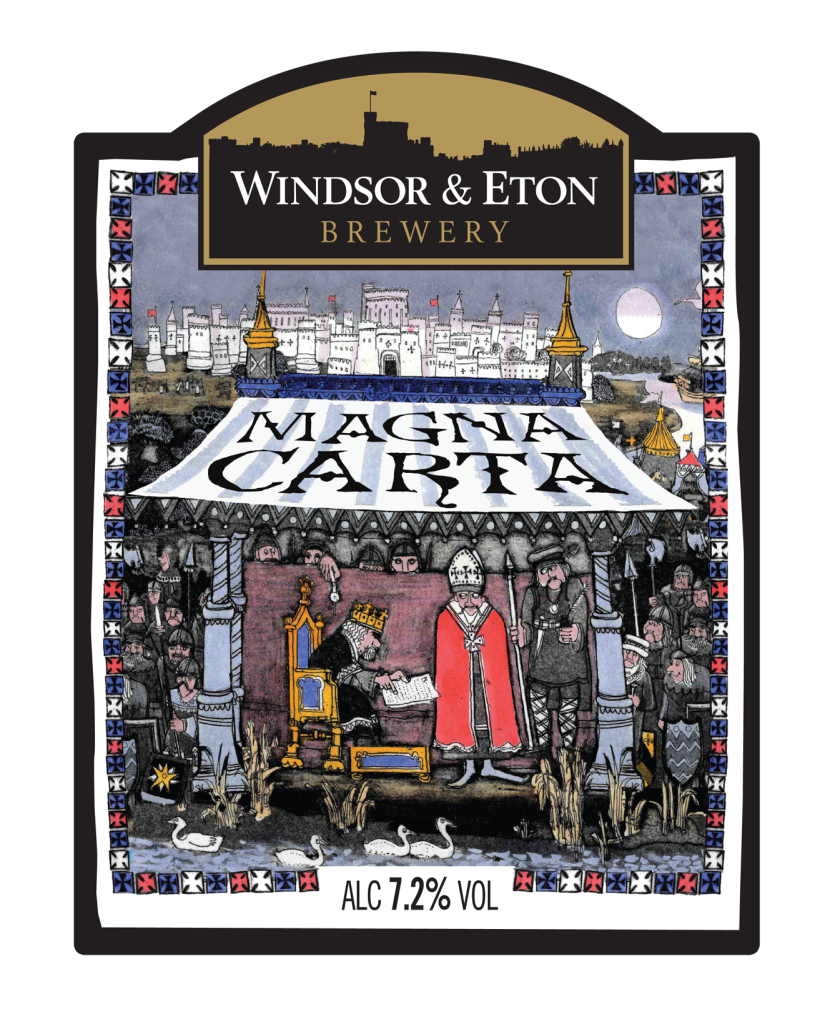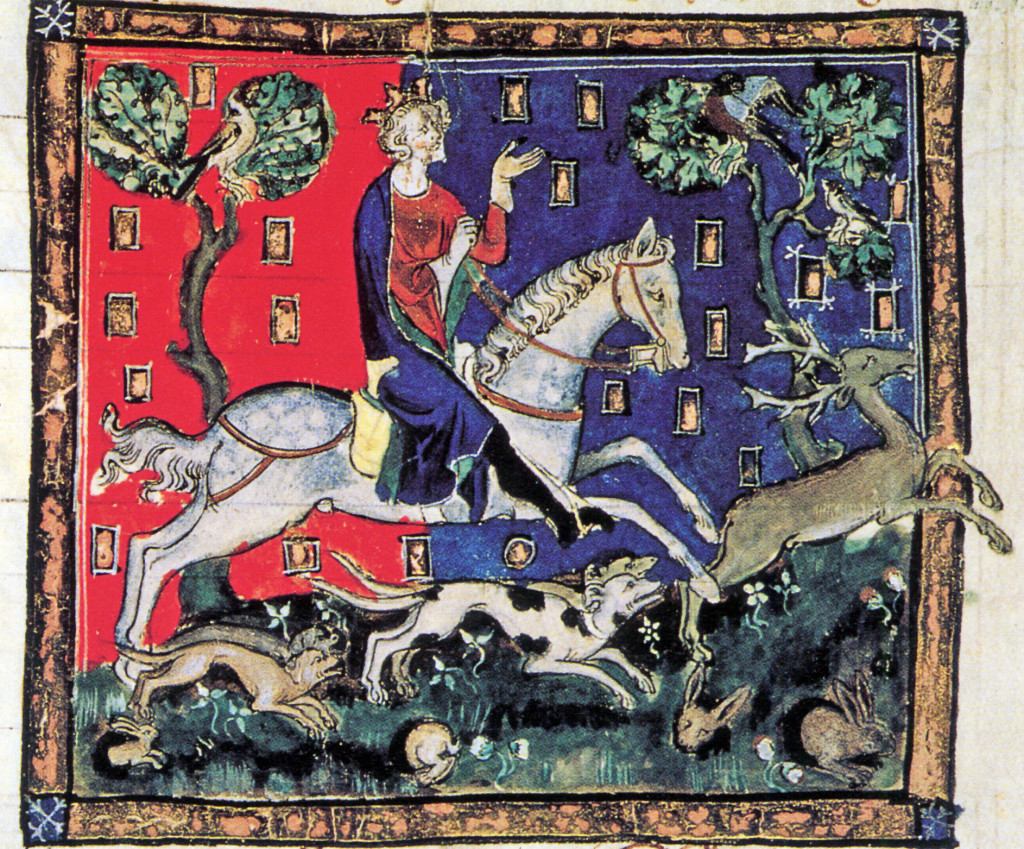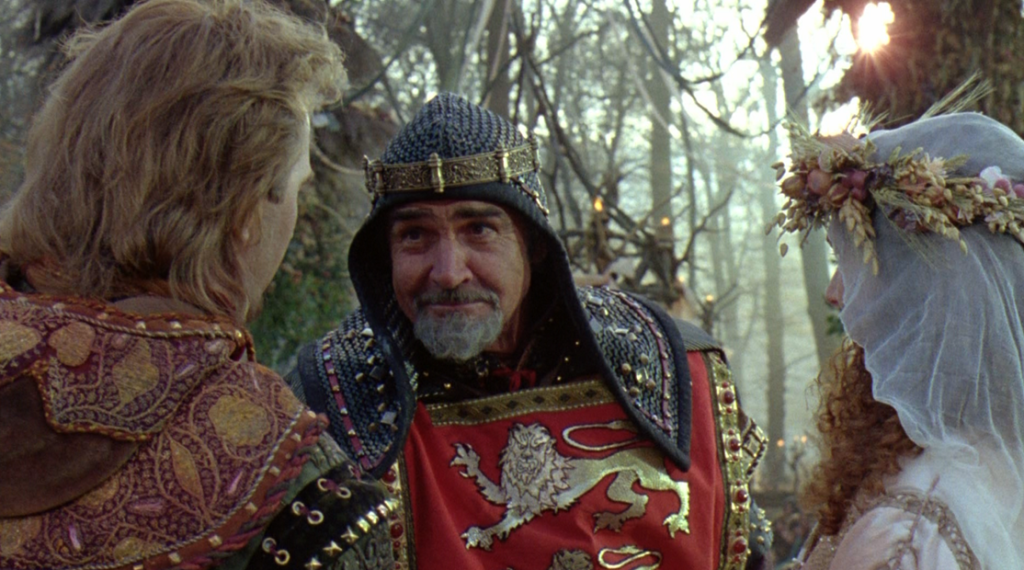This is how big the craft beer movement has grown internationally: The 800th anniversary of the issuance of the Magna Carta, which takes place later this month, is being commemorated by a beer.
It’s hard to imagine a brewery more suited to produce it than the Windsor & Eton Brewery. They’ve got scads of history kicking about the place. They’re situated about half a kilometer from Windsor Castle and five kilometers from the location where the document was actually signed 800 years ago. The brewery has a line in historical names, including Kohinoor (obviously an India Pale Ale), Conqueror 1075 (somewhat less obviously a Black IPA), and Parklife (dating all the way back to Damon Albarn).
The Magna Carta Barley Wine is based on a recipe from London Amateur Brewers member Manmohan Birdi and it is a sort of amalgam of various parts of brewing history. Barley Wine as it’s typically thought of is a later invention than the kinds of Gruit that would probably have been around at the time of the document’s issue. That said, this beer contains Root Licorice, Yarrow and Ground Ivy in addition to Fuggles and East Kent Goldings. At 7.2% it packs a wallop, but there’s apparently a 4% alcohol cask version if you can make it to England. It’s fair to say that there’s not a lot of beer like this out there in the market.
When the Magna Carta gets here at some point in the next couple of days, so will some of this beer. I’m told by the people at Magna Carta Canada that it will be available at some special events, so that should be some impetus to go and look at a piece of vellum.
What’s that? You need additional incentive to go and look at a piece of vellum? You don’t think the Magna Carta is relevant to Canada?
Did you know that the 35th article of the Magna Carta stipulates standard measures for Wine, Ale, Grain and Cloth? That’s pretty important. That’s why measurements are what they are. Except of course when they’re not and people routinely switch out 14, 16, 18 and 20 ounce pint glasses to achieve greater margin.
I see your problem. Let me see if I can explain the historical background. It’s a parable for our time.
What you basically know about King John is that he is a usurper and that he is not a good man and that Errol Flynn or possibly Cary Elwes is going to turn up and pop him one. The problem is that King John exists both as the villain in the Robin Hood stories and also as something of an ineffectual king. He signs the Magna Carta at the behest of a group of rebel barons and because he has the reigns at the time, we all know he must be the villain. History doesn’t really work that way.
The real driver of the story of the Magna Carta is Richard the Lionheart, as far as I can tell. He was a brave and clever soldier who didn’t care even a little about administering his Kingdom. He was a terrible king. Over the course of his reign, he spent something like six months in England. His father, Henry II was “in his own time… hated by almost everyone,” but he did manage to create some of the basis for English Common Law. Richard mostly spent money.
It’s not like he spent it on anything sensible either. The Saladin Tithe of 1188 raised something like 100,000 marks from the population of England (the handy online calculator tells me that’s 38 billion quid in today’s money). Gold and Silver was confiscated from churches and everyone was expected to give up 10% of their goods or be exempted from the tithe by joining the Third Crusade. Saladin had captured Jerusalem in 1187 and apparently, if you’re King Richard, it’s more important to bankrupt your citizenry and trudge 3000 miles to go and sort out an unwinnable proposition with incredibly poor supply lines at great expense than it is to pay any attention to your kingdom. He was quoted as saying “I would have sold London if I could find a buyer.”
Probably, the English people still have some money, those of them that aren’t lying dead on a field outside Jaffa or at the bottom of the Mediterranean. Presumably they had seen this coming and had hidden some rainy day money under the floorboards. On the way back to England, Richard gets captured and ransomed, essentially bleeding funds from his country as a result of a prolonged and ill-judged war in the middle east. His ransom was 150,000 marks (57 billion English sponduliks. Same calculator.)
The ransom was something like three times England’s GDP at the time. By the end of Richard’s ten year reign, England is something like a hundred billion pounds in debt. Debt’s not even a good way of explaining it because it’s not owed to anyone. They’ve essentially extracted the potential for the country to produce wealth. This is how bad Richard is with money: He dies after being shot in the neck with a crossbow and having the wound go gangrenous. He not only pardons the orphaned child who shot him, but he gives him a hundred shillings.

“King John was not a good man. He had his little ways and sometimes no one spoke to him for days and days and days.”
John comes to power in 1199 and England is more or less bankrupt. In order to raise money for the crown he has to get creative. At the time, as a result of William the Conqueror a century earlier, there’s a concept called the Royal Forest. A Royal Forest doesn’t necessarily have trees. It’s just a parcel of land. It could be heath or swamp or hills or forest. You’re not allowed to cause any damage to the animals or greenery of the Royal Forest unless you pay for the privilege.
That’s a nice little moneymaker, so what do you do if you’re John? That’s right. You expand the Royal Forest. By the time of the Magna Carta the Royal Forest is up to something like 20% of the land in England. What this means, essentially, is that if you own land that has been afforested by the crown, you now have to pay for the privilege to use your own land. If you own a bit of fenland that’s no good for anything but pigs, you have to pay pannage even though there’s no other use for it. If you want to heat your hovel in the winter, you’re paying estover for firewood and turbary for turf. If you want to keep a cow and that cow is going to eat grass, that’s agistment. That’s on land you theoretically own, mind.

This is King John riding o’er the sward. I’ve never been exactly sure what a sward is, but you can bet that if you owned one you were bloody well going to be paying swardage on it.
There are instances of entire villages being burned out in advance of afforestation amounting essentially to seizure of land. The law of the forest was enforced somewhat arbitrarily and without due process. You could be blinded or mutilated or killed for poaching a deer. You could be severely fined for just about anything.
The Magna Carta and the companion document the Charter of the Forest are a rare example of what happens when you push Monarchic rights too far. The Magna Carta disafforests all of the land taken by the crown during John’s reign and basically ensures that it can never happen again. The Charter of the Forest basically establishes personal property law. In one fell swoop the Magna Carta gets rid of unreasonable taxation, unreasonable seizure, establishes due process of law and ensures a properly sized pint.
You may be able to think of an example of a country who has, on an approximately 25 year long time frame, gotten themselves involved in an ill-judged and prolonged war in the middle east on ideological bases and who have accrued massive debt to do so and are now bleeding their citizenry dry while the misapplication of law frequently results in protest and riots. History tends to repeat in pattern.
The Magna Carta is a good reminder that there’s only so far you can push people. The fact that you can drink a beer while looking at it is just a bonus of which you should take advantage.
